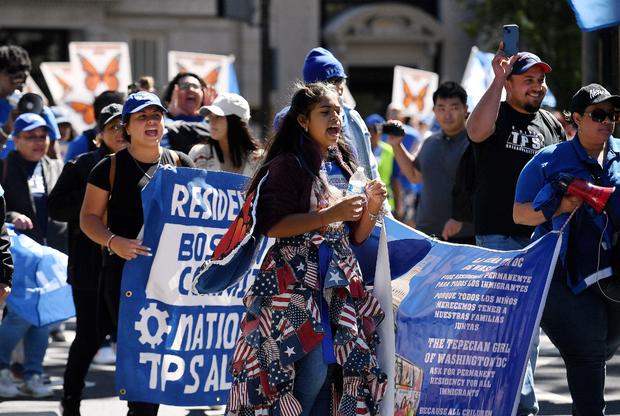Washington — A federal appeals court on Friday decided to revisit a case that could decide the fate of more than 300,000 immigrants living in the U.S. legally on humanitarian grounds, setting aside a ruling that had allowed the government to revoke their temporary legal status.
The 9th Circuit Court of Appeals voided a 2020 ruling issued by a three-judge panel in the California-based appeals court that had allowed the Trump administration to terminate the Temporary Protected Status (TPS) of hundreds of thousands of immigrants from El Salvador, Haiti, Honduras, Nepal, Nicaragua and Sudan.
Granting a request by attorneys representing immigrants enrolled in the TPS programs, the appeals court said it would hear the case once more, this time “en banc,” or with all active judges participating. It’s unclear though when the 9th Circuit could rule on the case again.
OLIVIER DOULIERY/AFP via Getty Images
Friday’s ruling is a victory, at least in the near-term, for TPS holders and their advocates, who have urged Congress for years to allow those enrolled in the program to apply for permanent U.S. residency.
The decision is also the latest development in a complicated, years-long legal battle over the TPS policy, which allows the Department of Homeland Security to give deportation protections and work permits to immigrants from countries beset by war, environmental disasters or other humanitarian crises.
As part of its efforts to curtail humanitarian immigration policies, the Trump administration tried to end multiple TPS programs, arguing that the authority had long been abused by other administrations.
A federal judge in 2018 barred the Trump administration from ending the TPS programs for El Salvador, Haiti, Nicaragua and Sudan, saying officials had not properly justified the decision, and that the terminations raised “serious questions” about whether they stemmed from animus against non-White immigrants.
In 2020, a three-judge panel of 9th Circuit judges set aside the lower court ruling, saying courts could not second guess the federal government’s TPS decisions. The panel also said it did not find a direct link between then-President Donald Trump’s disparaging comments about non-White immigrants, and the TPS terminations.
That ruling, however, never took effect because attorneys representing TPS holders asked for the case to be reheard. The litigation became connected with another lawsuit filed against the Trump administration’s efforts to end TPS for Nepal and Honduras, and the government agreed it would not terminate those policies until it was allowed to revoke the programs for El Salvador, Haiti, Nicaragua and Sudan.
Starting in 2021, the case was paused for more than a year as the Biden administration entered negotiations with lawyers for TPS holders to try to forge a deal to settle the case, including by potentially giving the immigrants in question a path to permanent status.
But those negotiations collapsed in October 2022, fueling concerns that TPS holders from the affected countries could lose their legal status and be forced to leave the U.S., or remain in the country without authorization.
In November, the Biden administration announced it would allow immigrants at the center of the case to keep their work permits and deportation protections at least one full year after the government is allowed to end the TPS programs in question, or until June 30, 2024 — whichever date comes later.
The Biden administration has taken a drastically different position on TPS than the Trump administration. It has created TPS designations for a record number of countries, including Afghanistan, Cameroon, Ethiopia, Ukraine and Venezuela, making hundreds of thousands of immigrants eligible for the temporary legal status.
The administration has also announced extensions of the TPS programs for Haitian and Sudanese immigrants living in the U.S., but it has not announced similar moves for immigrants from El Salvador, Nicaragua, Nepal and Honduras, despite requests from advocates.
Ahilan Arulanantham, the lead lawyer representing TPS holders, and co-director of the Center for Immigration Law and Policy at the UCLA School of Law, said the Biden administration can announce new programs for these countries to ensure the fate of his clients is not dictated by court rulings.
“We are pleased that the Ninth Circuit has agreed to rehear this case,” Arulanantham said. “But we should never have gotten to this point. President Biden had — and still has — every opportunity to fulfill his promise to protect the TPS-holder community.”
As of the end of 2021, 241,699 Salvadorans, 76,737 Hondurans, 14,556 Nepalis and 4,250 Nicaraguans were enrolled in the TPS program, according to U.S. Citizenship and Immigration Services (USCIS) data.
TPS allows beneficiaries to live and work in the country without fear of deportation, but it does not provide them a path to permanent residency or citizenship. Those who lose their TPS protections could become eligible for deportation, unless they apply for, and are granted, another immigration benefit.

